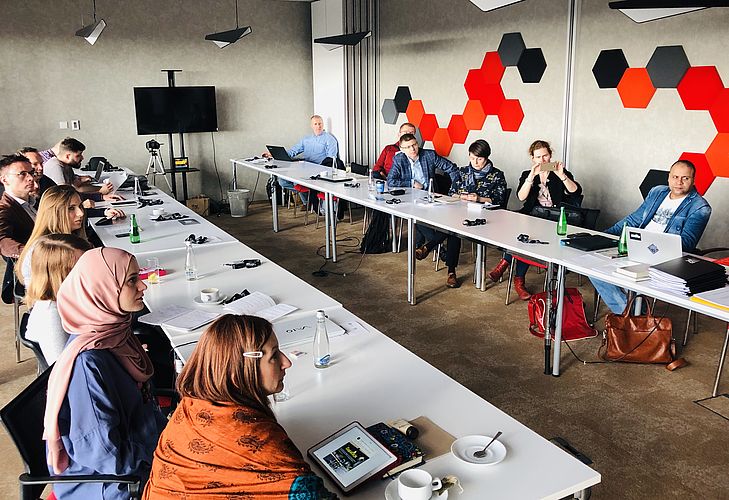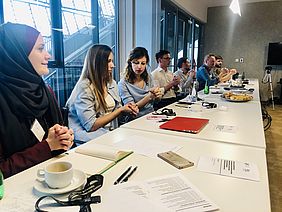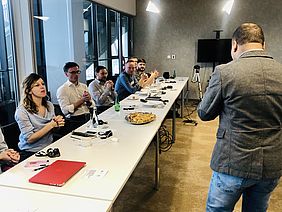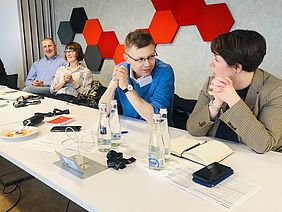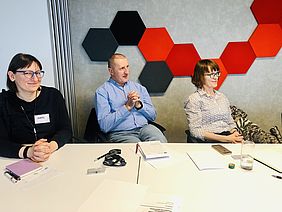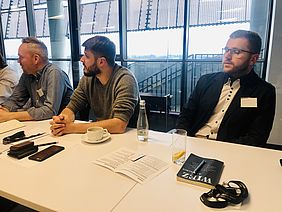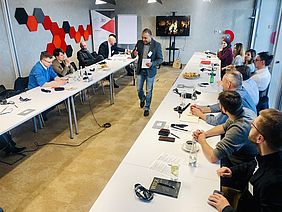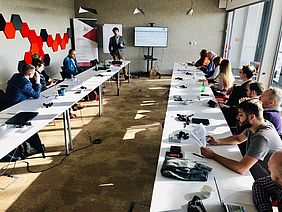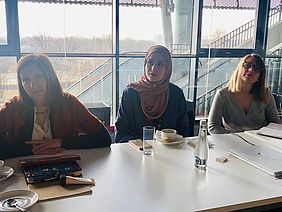Every person should feel safe and live free of fear. However, in today’s world a feeling of uncertainty and danger is growing. This feeling often leads to polarization of opinions and triggers a dangerous process of radicalized behavior. There is a need for strategic, preventative actions based on expert knowledge and experience to increase the level of safety in our everyday lives. As part of such interventions, in cooperation with the Social Security Institute we organized a two day training, inviting people to take part who — due to their own work — have the chance to identify early on those threatened by radicalization.
Presiding over the training as subject matter experts were: Doctor of Habilitation Małgorzata Michel (Institute of Social Prevention and Resocialization UJ), Anna Łukjanowicz (The Muslim Cultural Center in Warsaw), Gerard Bah (Delegate of KWP in Kielce for the Protection of Human Rights), Dr. Przemysław Witkowski (Journalist and Publicist), Jacek Purski (IBS), Andrzej Kruczyński (former officer of the Operational and Mobile Response Group), Jacek Mazurczak (associate of the Security and Cooperation Organization in Europe), Stanisław Czerczak (member of the RAN “EXIT” working group), and Tomasz Plaszczyk (an attorney).
The goals of the training were to:
- Sensitize participants to the problem of radicalization and to crimes motivated by hate
- Indicate how widespread these phenomena are in society and how they have a huge influence on our safety
- Explain the specificity of particular trends of extreme currents operating within Poland
- Show how to identify their members in advance — how they utilize symbols, codes and fashion , etc.
- Present the legal aspects of crimes motivated by hate and the methods of reacting to such types of incidents
- Indicate where to search for support in counteracting them via, among others, cooperation with the police, psychologists and local entities
- Show what a systematic approach to the prevention and counteraction of radicalization involves, including, among others, an expert group on matters of prevention and counteraction of radicalization
The first day, Monday, February 25, 2019, started with an introduction to the main subject of the training. It was delivered by Jacek Purski - journalist, political scientist, expert on matters of counteracting radicalization, member of the RAN “Expert Pool”, member of ASHOKA/The International Organization of Social Innovators, and President of the Social Security Institute. He discussed the issue of radicalization in Poland and showed the multidimensionality of this phenomenon.
Radicalization involves the denial of basic democratic values (among others, equality and diversity), as well as a growing tendency to use violence to achieve ideological goals. Hate crimes and acts of terror can be a tragic culmination of this process. The axis of the radicalization process consists of various ideologies, for example, far right extremism in our part of Europe, or Islamic extremism in western Europe.
Next, Doctor of Habilitation Małgorzata Michel of the Institute of Social Prevention and Resocialization at Jagiellonian University presented the issue of radicalized gangs of pseudo-fans. As her scientific interests are concentrated on —radicalized among others — issues concerning a local prevention and resocialization system for minors (as well as Urban Studies in light of the actions of child and youth gangs) she discussed in detail the activity of gangs of radicalized football fans in Kraków and Łódż, concentrating on her own work experience with the families of victims of gang violence. She described and analyzed the process of political radicalization in such groups, pointing out possible courses of action to rehabilitate perpetrators of crimes related with the above-mentioned gangs and their immediate environment.
Then, Dr. Przemysław Witkowski showed how to — in practice — effectuate research, studies and analyses of radical environments. Witkowski is a journalist, publicist and university lecturer specializing in radicalized groups. He has published in newspapers such as “Krytyka Polityczna”, “Przegląd”, “Gazeta Wyborcza”, “Przekrój”, “Odra”, “Vice”, “Le Monde diplomatique” and the website OKO.press - primarily articles on the extreme right and extreme left. He introduced the environment surrounding nationalistic followers and the type of path a journalist goes through — from news about a one-time event to a complete informational resource on the given environment — conveying his experience with research, a study of archival sources at the Institute of National Remembrance and National Library, work with directors from radicalized environments and source texts.
The first day ended with an additional session of questions from participants to the experts.
The second day, Tuesday, February 26 2019, started with a presentation from Jacek Mazurczak entitled “Radicalization - Prevention and Counteraction. Legal Aspects.” Mazurczak is the former chief specialist on matters of hate crime monitoring at the Ministry of Interior Affairs and Administration, a current associate for the Organization of Security and Cooperation in Europe, and an author of training programs in the field of combating crimes against human rights. In addition, Mazurczak, together with Tomasz Plaszczyk - a lawyer, former mayor who served 15 years at the investigative department of the Agency of Internal Security (where he led numerous criminal proceedings stemming from article 256 sections 1 and 2 of the criminal code) — performed a detailed analysis of a case showing how one can, in accordance with Polish law, go through the whole process of activities connected with hate crimes (from observation, through to reporting to the appropriate government bodies, up until eventual court orders).
Subsequently, Anna Łukjanowicz, representative for the Center for Muslim Culture in Warsaw and its coordinator on matters of Culture and Education, and an active member of the Muslim Community, gave a presentation to illustrate the Muslim perspective on the radicalization process. One was able to learn about the radicalization of its members, as well as get acquainted with the perspective of people affected by violence on an Islamophobic basis.
Stanisław Czerczak presented the perspective of radicalized youth in his lecture “I Hated Everyone”. In the 1990s he was associated with a neo-nazi movement, and today is a member of the RAN “EXIT” working group, training the police, prison services and border force, as well as educating youth and acting against discrimination, intolerance and hate.
During both days of the training, lectures, presentations and discussions were interspersed with interpersonal, sensitizing and educational exercises such as “React”, “Differences and Similarities”, and “Who is that person?” that were led by Gerard Bah (graduate of the Helsinki School of Human Rights, certified trainer of multicultural competences, and Glass of Equality award laureate).
In a summary carried out under the slogan “And what next? A cross-sectoral approach!”, Jacek Purski, experts and participants came to the conclusion that the problem of radicalization which is capable of being carried out via violence and extremism and terrorism is not one which is sufficiently recognized in Poland. Knowledge of the very phenomenon of radicalization itself, as well as its consequences, is lacking. As a result, there is a lack of consistent, complex systems of prevention and counteraction towards radicalization, both at the local and central level.
The participants also recognized that consistent counteraction, education and communication can be an antidote to radicalization, hate and violence. Through a quick, multidimensional, response connected with Poland wide research and education, solutions to the problem can be sought.
The creation of a network of experts and a system of direct response to crisis situations is also necessary, on top of the development and implementation of good practices and a strengthening of the rule of law.


